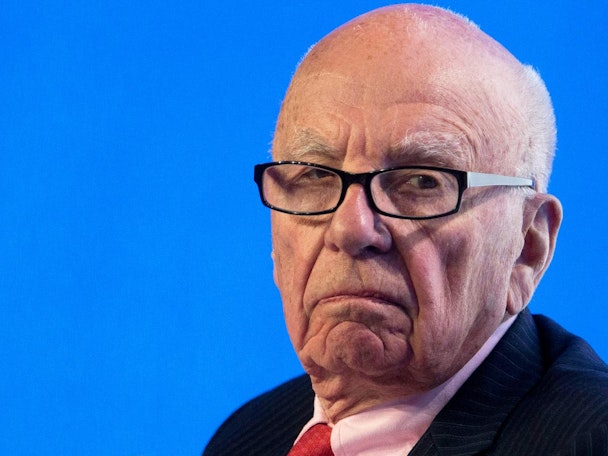Will Rupert Murdoch's surprise Sky bid succeed this time around?
If there’s anyone in the media industry who is guaranteed to spring a surprise, it’s Rupert Murdoch.

And he certainly did that when he announced (through his 21st Century Fox corporation) an audacious bid to fully take over the satellite TV giant Sky. Sky said on Friday that 21st Century Fox had reached a preliminary agreement to acquire the 61% stake in the West London-based broadcaster it did not already own. The new takeover offer would value Sky at about $23bn.
Even at the age of 85, the mogul seems to have lost none of his hunger for an eye-popping deal; or any of his desire to shake up the establishment (of which he is now indubitably a part).
Of course, this isn’t his first attempt to regain total control of Sky. Back in 2011, 21st Century Fox’s predecessor, News Corporation, tried the same thing. It was all going well. Then culture secretary Jeremy Hunt was an enthusiastic cheerleader for the deal, and although there was the matter of regulatory concerns (mostly over media plurality) to be overcome, the chances of the takeover going through seemed pretty good.
Then the phone-hacking scandal blew up. One of News Corp’s newspapers, the News of the World, was found to have been hacking into people’s phones – a practice that was illegal as well as being intrusive and, in some cases, so distasteful as to be beyond the pale.
As a result, the NoTW was closed, Murdoch and his son/heir apparent James were forced to appear before a Parliamentary Committee and the Leveson Inquiry, and News Corp was forced to shell out millions in compensation. The takeover bid was dropped, as it now had virtually no chance of succeeding.
Five years later, and the takeover bid’s back. And this time, it has a good chance of succeeding.
And here’s why.
First off, things have changed at News Corp – the company no longer exists in the form it did in 2011. In the wake of the scandal, Murdoch restructured his assets. In 2013 the company was split in two. Entertainment assets (Fox TV and movies, Sky, shares in National Geographic TV and Hulu, and a 50% share in TV producer Endemol/Shine) were housed in a new company called 21st Century Fox; while the publishing assets – UK newspapers like the Sun and the Times; the Wall Street Journal and other US publications; Australian and Indian publications; Wireless Group, the radio station whose brands include Talksport; and book publisher HaperCollins – sat within new News Corp.
This split was well-judged, and helped “detoxify” the entertainment brands, as well as separating these much more profitable operations from the legacy publishing business. And although still a concern for regulators, the separation of the two business streams will help soothe fears over plurality (Sky also has a smaller share of the all-important football broadcast rights market than it did five years ago).
There will be – and in fact already has been – opposition to the deal, but the current government has a lot on its plate and is likely to wave it through.
Nobody is likely to stump up a rival bid either, as most of the big players – Viacom, Liberty Media, Disney – would either balk at the price or run into regulatory difficulties; and that’s assuming they could persuade 21st Century Fox to part with its share, which seems extremely unlikely.
But why bid now? 21st Century Fox said that its 39% stake in Sky was “not a natural end position”. What this really means is that its ambitions to gobble up the whole business has never gone away.
It is well-known in medialand that of all the assets in his sprawling empire, Murdoch (whose family has a tiny share of both 21st Century Fox and News Corp, but nonetheless wield enormous power within the companies) has a particular attachment to two: the Sun (which he took over in 1969, and which formed the basis of his empire); and Sky, which he set up in 1989. Murdoch betted his entire company on the fledgling satellite TV company. After a rocky start, it established itself thanks to securing lucrative Premier League football broadcast rights and the collapse of its rivals. Murdoch would love nothing better than to see his beloved creation fully back within the family fold.
It’s not just about emotion, however. Acquiring all of Sky would simplify 21st Century Fox’s operations. Sky is also a big player not just in the UK, but across Europe, giving US-based Fox the opportunity to woo new consumers in markets it’s not yet cracked. The quality of Sky’s technological offering is also rightly acclaimed, and would give Fox access to some cutting-edge tech, as well as an extremely talented management team and roster of creative and heaps of content. And Sky has a growing offer in the increasingly important broadband and mobile space.
It would also protect Sky, which remains vulnerable to further incursions into its lucrative sporting rights portfolio (golf, F1, boxing and others, as well as football), particularly from an ambitious BT.
Then there is the weak pound. Since the EU referendum in June, sterling has collapsed against both the dollar and the euro, making British-held assets something of a bargain to overseas buyers. Most forex analysts believed sterling to be overvalued, and that while there’s no doubt the pound will claw back some value against other currencies at some point, it’s likely that its value will remain depressed for some time to come.
Where the bid will run into difficulty is with existing stockholders, who are unlikely to be impressed with their shares being sold off for a bargain to Murdoch. Sky has been a good investment for some time, being fairly recession-proof (it sailed through the 2007/8 crash relatively unscathed, although shares have had a torrid time in recent months), and shareholders are unlikely to let their stock go for anything less than a premium.
Already today (Monday December 11) one of the City’s most influential investors, Standard Life, joined a chorus of investors (including Jupiter Asset Management and Royal London) calling for Sky’s deputy chairman Martin Gilbert to push Murdoch to increase the £10.75-a-share, or £18.5bn, bid. It is said that Gilbert has already pushed the bid up to £10.75 from an initial £10, and some City watchers believe that there is no more cash in the bid pot – and £18.5bn is a lot of money, as well as representing a 40% premium on the broadcaster’s share price of the day before the bid was made.
Add in the fact that rival bids are unlikely, and that Sky’s independent directors are happy with the deal, and the deal looks increasingly credible. Wall Street has also been making favourable noises, and a materially improved bid looks unlikely. Investors may decide to bite the bullet and sell up.
The only hope for rival broadcasters, media owners and other parties unhappy with the deal lies with culture minister Karen Bradley, who has to decide whether or not the bid needs to be the subject of a “public interest intervention” and be referred to Ofcom. The next few days and weeks will be crucial: if opponents can mobilise and put together a convincing case, Ms Bradley will have no choice but to make a referral; Sky dwarfs its commercial rivals and has bigger budgets than the BBC.
But even if a referral is made, both the nature of the bidder, and the Murdoch family’s role within the company, has changed since 2011. And with the rise of Viacom in the UK, as well as BT’s increasingly aggressive moves into broadcasting, the media landscape has changed too.
Murdoch, whose energy remains undiminished despite his advancing years, will probably feel he can play the waiting game. It’s thrilling stuff for media-watchers, if slightly disconcerting for rivals and those who see Murdoch as the master of a less-than-benificent empire.
As the broadcasters say: stay tuned to this channel for more developments.
Barry Dudley is a partner at Green Square, corporate finance advisors to the media and marketing sector

